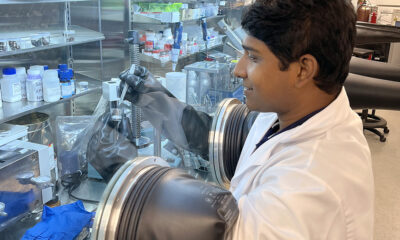Top Stories
Strategic Alliances Crucial for Resilient Global Supply Chains

URGENT UPDATE: New research from UBC Okanagan reveals that strategic alliances are essential for protecting global supply chains, especially amid ongoing trade wars and political disputes. The study, led by Dr. Amin Ahmadi Digehsara, emphasizes that in today’s volatile trade environment, it is not just what you know, but critically, who you know.
The findings indicate that strong international partnerships can enhance supply chain resilience by up to eight times. This development is crucial as supply chains are increasingly vulnerable to disruptions from both natural events and human-caused actions, such as tariffs and quotas.
Dr. Ahmadi Digehsara explains that while spreading operations across different countries may mitigate the impact of natural disasters, it does little against intentional disruptions. “Without cooperation, even moderate disruptions can slice profits by 20 to 30 percent,” he warns. The implications of this research are immediate and significant for businesses worldwide.
The study draws parallels with the rapid disruptions faced during the Trump administration, when tariffs were imposed that shook industries overnight. Companies with strong alliances were able to adapt swiftly, while others faced dire consequences. A notable example occurred in 2018 when China raised tariffs on US-built SUVs. BMW leveraged its joint venture with Brilliance Automotive to maintain production locally and achieve record sales, unlike competitors who struggled.
In collaboration with Dr. Amir Ardestani-Jaafari and Dr. Sam Aflaki from HEC Paris Business School, the researchers developed a model that simulates the benefits of strategic alliances, demonstrating that even a single alliance can boost profits by 50 percent in uncertain environments. “Our modelling shows that strategic alliances significantly improve worst-case scenarios,” says Dr. Ardestani-Jaafari.
The urgency of these findings cannot be overstated. As global supply chains become increasingly fragile, businesses must prioritize building strong partnerships. Dr. Ardestani-Jaafari highlights that alliances do not need to be limited to government-level agreements. Companies should actively seek co-production, shared logistics, and long-term contracts to safeguard their operations in politically uncertain climates.
“The companies that will thrive are the ones that cultivate flexible relationships to ensure goods keep moving and markets remain stable,” he states. Investing in these alliances can yield significant returns, cutting disruption costs by two to three times compared to merely holding extra inventory.
This research underscores a critical turning point for businesses navigating the complexities of modern trade. As globalization continues to evolve, the ability to adapt through strategic partnerships will define success in a landscape characterized by uncertainty. The world is watching to see how companies respond to these pressing challenges.
This study is published in the Transportation Research Part E: Logistics and Transportation Review and serves as a vital resource for understanding the dynamics of global supply chains in today’s interconnected world.
Stay tuned for more updates as businesses adjust their strategies based on these groundbreaking findings.
-

 Politics4 weeks ago
Politics4 weeks agoSecwepemc First Nation Seeks Aboriginal Title Over Kamloops Area
-

 World5 months ago
World5 months agoScientists Unearth Ancient Antarctic Ice to Unlock Climate Secrets
-

 Entertainment5 months ago
Entertainment5 months agoTrump and McCormick to Announce $70 Billion Energy Investments
-

 Science5 months ago
Science5 months agoFour Astronauts Return to Earth After International Space Station Mission
-

 Lifestyle5 months ago
Lifestyle5 months agoTransLink Launches Food Truck Program to Boost Revenue in Vancouver
-

 Technology3 months ago
Technology3 months agoApple Notes Enhances Functionality with Markdown Support in macOS 26
-

 Lifestyle3 months ago
Lifestyle3 months agoManitoba’s Burger Champion Shines Again Amid Dining Innovations
-

 Top Stories2 months ago
Top Stories2 months agoUrgent Update: Fatal Crash on Highway 99 Claims Life of Pitt Meadows Man
-

 Politics4 months ago
Politics4 months agoUkrainian Tennis Star Elina Svitolina Faces Death Threats Online
-

 Sports5 months ago
Sports5 months agoSearch Underway for Missing Hunter Amid Hokkaido Bear Emergency
-

 Politics5 months ago
Politics5 months agoCarney Engages First Nations Leaders at Development Law Summit
-

 Technology5 months ago
Technology5 months agoFrosthaven Launches Early Access on July 31, 2025




















